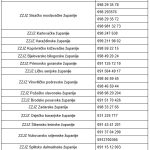March 15, 2020 – Croatian journalist working in Bonn, Germany, Dunja Dragojević, writes for DW about how she was supposed to come back home to Croatia, to her Korčula home this week, when the global coronavirus health crisis prevented that from happening.
Dragojević is a well-known last name on Korčula, in the town of Vela Luka, which is precisely where she was planning to travel to, she says in her column on Deutsche Welle:
“While you’re reading these lines, I was supposed to be enjoying the view from the header photo. Live. This photo is the screensaver on my computer in my Bonn office. Every day when I turn on my computer, I take a deep breath and think about how I’d rather be on the terrace of my house on Korčula.
I’ve had one foot firmly in Bonn for years, but I try to make my other foot jump to my island as often as I can. And I have to admit it has been quite successful. Back in the day, Bonn and Split were on opposite sides of Europe, with at least two or more days of travel or hundreds of Euros of expenses between them. But, after the Eurowings, EasyJets and RyanAirs appeared, they became two cities with less than two hours of pleasant flight between them, for which you could get a ticket for under 50 Euros. I had one of those tickets, and I planned to go to Croatia for five days, leaving this Sunday – flying from Bonn to Split and then take a ferry to Vela Luka. Up until a couple of days ago, I couldn’t even imagine the trip not happening.
On Tuesday, I returned from Vienna, where I went to report on the exhibition opening in Kunsthalle; I flew on the Eurowings flight, travelled and lived entirely normally. Corona was savaging Italy, of course, and it was in the media and on my radar, but not in my life. My kids were regularly going to school, their football, handball, and tennis practices, celebrating the carnival, which is significant in the Bonn region. North Rhine-Westphalia, the German state in which I live, seemed to be one of the hotspots since Corona appeared in Germany, partially because the carnival helped the spread of the virus. My friends and family from Croatia asked about the situation and our health, but I ignored some of them, not even replying, as I was annoyed by the panic which was created. I thought people around me felt the same. The news of 600, 700, 800 infected in North Rhine-Westphalia made people say the same things I did: so what, hundreds, and thousands get the common flu each year. The shelves in the stores were filled with everything except disinfectants and toilet paper (I still don’t understand what the deal with the TP is?!). Honestly, at that point, I thought it was cool to ignore Corona and the threat it posed.
Sometime during Thursday, March 12th, I was shocked by how severely and how fast the things were developing, so I started to wonder if I left for Croatia, would I be able to return to my family in Bonn five days later. Croatia had a very low number of infected people. My husband said he’d go. A colleague told me that there are no guarantees, but that he would go. I’m leaving tomorrow, a friend said to me on Thursday, as she had planned to spend the weekend in Makarska. Eurowings emailed me a reminder that I can self-check-in for my flight. It made me consider why I was panicking. Eurowings flies to Split, and on Korčula, in my deserted cove, I’m as safe as I can be. Croatia is not a high-risk zone; in five days, things won’t get that bad. And then a thought came to mind: why am I only thinking about myself? What if I’m carrying the virus, and I’m not even aware of that, and we know that’s possible? I recently reported from Berlinale, and then from Vienna, and there were three thousand people at the opening. What if I were to infect my parents, and their age puts them in the high-risk group? What if I became the one who brought coronavirus to my little island? And when all of those questions started racing in my mind, that’s when I decided, no matter what German or Croatian institutions said, I won’t be travelling to Croatia. That’s the moment when I realized that this is the moment of solidarity Angela Merkel talked about and that our lives in the upcoming days and months will often test our solidarity, readiness to make sacrifices, and, in a way, our humility. I realized that the coronavirus would change our lives dramatically, and that brought me back to the early nineties, in my Split school year 1991/1992, a year without school trips, a year in which my safe and careless life changed.
On Friday, I came to work and told everyone I wasn’t travelling. My life still appeared quite normal on that Friday the 13th. The kids went to school. My daughter planned a birthday party for her 15th birthday; in various WhatsApp groups on my phone messages kept coming organizing the car-pooling schedule for the football and handball games that my son was supposed to participate in during the weekend. And then, during the morning, the news came that the Bundesleague is postponed, but after the next Tuesday. The friend sent me the message “I haven’t left” with the photo of the Civil Protection Headquarters of the Međimurje County in which it’s stated that the people coming from Germany to Croatia need to self-isolate for 14 days. When I came back home from work, I found out that my children will have a forced five-week vacation, and after that, the emails started arriving: all sports training and games are cancelled until mid-April, and nobody dares forecast what will happen then. In the meantime, all the museums closed, concerts and theatre shows were cancelled in Bonn. And the news about Bundesleague we published a couple of hours ago was yesterday’s news – all of the games were immediately cancelled. Firstly they were supposed to be played in front of empty bleachers, and then they were cancelled.
On Saturday I went shopping: I needed, among other things, flour because I wanted to make pancakes. I had to go to five stores, and in all of them, the shelves with flour, UHT milk, and pasta were empty. The coronavirus has, undoubtedly, taken over Germany, no matter what the actual data on the number of infected people says. And it says that there are 4000 infected people and eight deceased as of Saturday night (March 14th). After this weekend, nothing will be the same in Germany as it was before this Friday the 13th.
Eurowings sent me an email with the subject “COVID-19 Update”, in which they inform me that the “air in the airplane consists of 60% of the fresh air from the inside” and that the “air circulating within the cabin has been filtered and dust, bacteria, and viruses removed from it.” We can thank the filtering process for the fact that the air in the airplane is as clean as in an operating room. But, at the end of the email, they still offered to replace my ticket free of usual charges for a later flight to Split. That’s precisely what I did. My new planned date is May 3rd. Then a new email arrived in my inbox, telling me that I’m 51 days away from my flight. I hope I am. I hope I’ll be able to enjoy the view from my terrace on Korčula in 51 days. And that life will get back to normal. However, currently, it’s very difficult to believe it will.”
Read more about the COVID-19 (coronavirus) in Croatia on our dedicated page.










